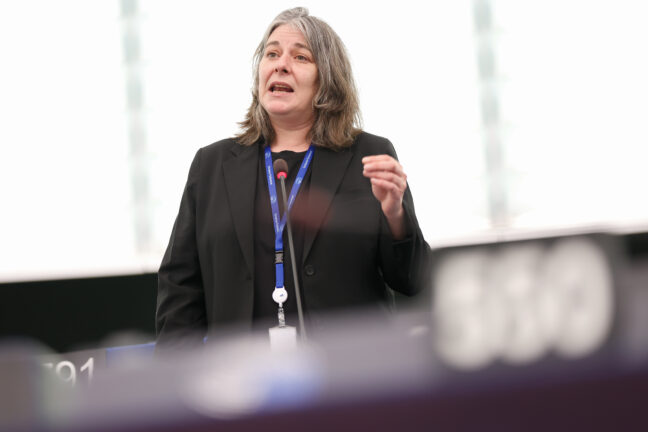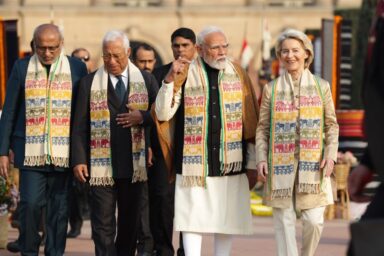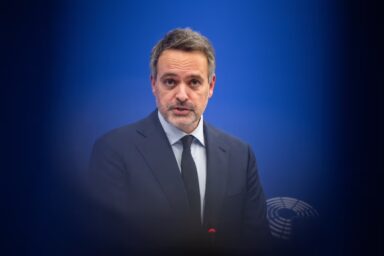Italian socialist MEP Cecilia Strada condemns Europe’s escalating rhetoric that frames migrants as dangers rather than humans. In an EU Perspectives interview, the former migrant rights activist made little effort to conceal her disillusionment with the continent’s hardening political tone, which now dominates a debate once focused on humanitarian concerns.
“It felt like a year that lasted three.” MEP Cecilia Strada (S&D/ITA) doesn’t mince words when describing her first year in the European Parliament. Between complex legislative files, increasingly restrictive migration policies, and what she calls a ‘dehumanizing’ cultural climate, Ms Strada painted a grim picture to EU Perspectives of a parliamentary term she believes has marked a point of no return in Europe’s handling of migration.
In her previous role, Ms Strada was founder and activist for ResQPeople Ong, a non-profit seeking to improve the lot of refugees and migrants coming to Italy via the Meditarranean Sea. “When I arrived (in Brussels), longtime colleagues told me: congratulations, you’ve joined the worst legislature ever. Now I understand what they meant,” she says with regret.
A meaningful connection
The main concern is the implementation of the EU Pact on Migration and Asylum, approved in recent months, and the gradual shift in the migration narrative – from a humanitarian lens to a purely security-based one. “We’ve moved from the ‘instrumentalization’ of migration to its ‘weaponization’, turning it into a threat. It’s a profound cultural shift: we no longer talk about people, but about dangers,” the MEP says.
Ms Strada is also highly critical of the legislative proposal on the list of safe third countries, a file she is personally involved with. “Asylum is an individual right,” she insists. “You can’t preemptively declare an entire country safe for everyone.” The list includes countries like Egypt – where, as she points out, “arbitrary use of anti-terrorism laws is widespread” – and Bangladesh, where “homosexuality can be punished with life imprisonment.” Yet these countries are labeled as ‘generally safe’.
You might be interested
It’s a contradiction she denounces openly: “This is an ideological construct to facilitate deportations and fast-track border procedures, with fewer legal safeguards and greater risks for vulnerable individuals.” She also criticizes the European Commission’s proposal to abolish, or water down, the legal requirement for a meaningful connection between the asylum seeker and the third country (where they are deported to). In some cases, a seeker’s deportation to a certain country finds justification in a mere transit through the said country. “What is this, ‘Muslimland’? Are we sending everyone who’s Muslim there? It’s legal and political madness.”
We must learn to tell complex stories in a simple way. – MEP Cecilia Strada (S&D/ITA)
According to Ms Strada, the EU’s strategy is now clear: to normalise the exception. From illegal pushbacks in Poland tacitly accepted by the Commission, to the suspension of Schengen and border externalization, “we’re in a state of permanent exception, always justified by crisis, war, fear.”
A deceitful narrative
But it’s not just a technical or legal drift. “There’s a narrative that deceives the public,” the MEP says. “When politicians cite citizens’ fatigue, the problem isn’t migrants – it’s failed policies what has fueled frustration.” Ms Strada accuses parts of the European political establishment of using migrants as “scapegoats” in a “deliberate deception” to win votes.
We’re in a state of permanent exception, always justified by crisis, war, fear. – MEP Cecilia Strada (S&D/ITA)
When asked what alternative strategy could be pursued, Ms Strada doesn’t stop at calling for resistance. “We must learn to tell complex stories in a simple way. It’s hard, but necessary. Otherwise, empty slogans that speak to the gut always win over those that speak to the head.” She urges progressive forces to “get out of the bubble,” to talk to those who think differently, and most importantly, to rebuild trust with those who no longer vote. “If we ended up with this Commission and this Council, it’s also because we voted badly – or didn’t vote at all.”
Despite her frustration, Ms Strada refuses to give up. “I haven’t lost my soul,” she says, as an activist and now an MEP. “Yes, I’m angry, but I use my privilege to fight. I owe it to those who have no voice.”











